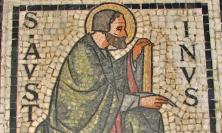There is no denying that all of us feel a sense of confusion and unrest at some point in our lives, but how do we overcome this? Sr Margaret Atkins argues that such instability comes from a lack of unity within ourselves, and explains that we will not be free of it unless we strive to be at one with ourselves and with God.
Unity and beauty
St Augustine thought that a thing was beautiful when it was, in a certain way, one: fully united with itself. This was true of a star or of a song, of a worm or a workshop. It was true of human communities: a city, a convent, a church. It was true also of individual human beings. What makes our personalities ugly, what makes our lives miserable, is disunity and fragmentation. The more unified we become, the more we become what we are meant to be. At some deep level, often perhaps without realising it, we yearn for this unity; another name for it is ‘peace’.
St Augustine stood in a long tradition, reaching back to Plato and others before him, and stretching forward into centuries of Christian, and indeed Islamic, thought. The idea was central to the high philosophy of neo-Platonism. It is also, I suggest, a basic part of our ordinary ways of thinking. Unfortunately, we are inconsistent. Although we instinctively recognise the beauty and goodness of being at one with ourselves (and so with others), we are torn in different directions. We are pulled apart by our desires, and muddled by our thoughts. This does not make us happy. But to grow into maturity, into harmony with ourselves, is the task of a lifetime.
What we say about ourselves
One way to discover what people instinctively think about ethics is to listen to ordinary language. This is the sort of thing that we say about each other:
Cathy Constant
You can rely on her.
What you see is what you get.
She means what she says.
You know where you are with her.
She knows her own mind.
Rosie Random
She says she’ll do it, but then ...
Can’t trust her an inch.
She’s a liar.
Always changing her mind.
She’s just confused.
Most of us would rather be likened to Cathy than Rosie. Such a judgement, of course, would have practical implications. Which of the two would you prefer to employ, or to elect, or to marry? Cathy is attractive because she is always the same; she agrees with herself; she is ‘together’ and ‘single-minded’. Her life, her projects and her relationships are coherent. Rosie suggests duality and division; she calls to mind expressions such as ‘two-faced’, ‘double standards’, perhaps even ‘split personality’.
Broadly speaking, there are two ways for us to be divided within ourselves. Firstly, our thoughts and emotions, words and deeds, can conflict with one another: ‘She says she’ll do it, but then ...’, ‘She’s a liar’, ‘Can’t trust her an inch’. Secondly, our thoughts can be inconsistent with themselves: ‘Always changing her mind’, ‘She’s just confused’.
Doing and saying the truth
Let’s suppose for a moment that Rosie, like Cathy, actually knows what she thinks. She wants to be a generous, brave and loyal friend and colleague. Her thoughts are in the right place. The trouble is that other bits of her do not follow. Rosie is weak. When it comes to the crunch, other feelings get the better of her good intentions. Plato argued that our souls were divided into parts, and these could pull in different directions. My longing for a drink draws me irresistibly towards the delicious looking liquid in that glass, even though my rational mind is telling me that it is poisonous. St Augustine described how he could feel torn apart by wanting incompatible things. Rosie would like to make her parents happy, but she is desperate to keep seeing her ‘unsuitable’ boyfriend and would love another drink, and just couldn’t bear to miss the party that happens to coincide with her mother’s birthday .... So, too, St Peter: he had really meant it when he said to Jesus, ‘Even if I must die with you, I will not deny you’ (Matthew 26:35). St Paul also understood this sort of experience: ‘For I do not do what I want, but I do the very thing that I hate’ (Romans 7:15).
Another striking way of being inconsistent is to lie. Imagine that Rosie’s feelings correspond perfectly to her thoughts; she believes that she is behaving quite reasonably. The trouble now is with what she says. For though she does not care whether she worries her parents, or drinks too much, or gets back late, she does want to avoid a row. ‘The bus didn’t come, so I’m staying with Jane,’ ‘They needed me for another night shift.’ What does it matter what she tells them, as long as it works? St Peter was less calculating, but naked fear had the same effect on him: ‘I do not know the man’ (Matthew 27:72, 74).
Our newspapers are full of the big lies: did the Prime Minister mislead the House of Commons over weapons of mass destruction in Iraq? Did the bankers knowingly take outrageous risks with their investors’ money? Did the footballer cheat on his wife? We take less notice of the little lies which permeate our everyday life. I began to reflect on this when one of my new students – let’s call her Sarah – asked me to sign a passport photo to authenticate her identity. ‘But it says that I need to have known you for two years,’ I pointed out. ‘That doesn’t matter,’ she replied. It was completely unimportant to her whether or not I put my signature to a lie. So why, I asked myself, did it matter to me?
There are several reasons to worry about the prevalence of petty lying. One is the slippery slope: it is a short slide from Sarah to St Peter. More fundamentally, lies directly destroy our ability to converse with one another. If I cannot in normal circumstances believe what other people say, spontaneously and without anxiety, then communication will become impossible. Social life will simply break down. Yet there is a still more basic reason for our natural uneasiness when we tell lies, or when we hear them. St Augustine put it like this: the liar has a ‘double heart’. There is a split between the words in their mind and the words on their lips. They have deliberately abandoned the simplicity for which we all naturally strive.
‘If we say that we have fellowship with him while we walk in darkness, we lie and we do not live according to the truth’ (I John 1:6). In Greek, the expression John uses is very vivid; literally it means, ‘we do not do the truth.’ There is a gap between what we know about ourselves and other people and the world around us, and what we do and say. How can we overcome such a gap? How do we set about the task of becoming less like Rosie and more like Cathy? The first step, of course, is to want it. The hardened liar does not care that he has a double heart or a double tongue. He sees no value in being honest and open and trustworthy. Most of us, thankfully, do not agree.
However, we still succumb to temptation. We can glimpse the unified people we would like to be, the ‘simple hearts’ we would like to possess. But how do we get from here to there? Over the centuries, philosophers and theologians, both Christian and non-Christian, have offered a remedy that we now find sharply counter-cultural. For they explained that what we needed to do was educate our desires. The world of consumerism, of course, requires us to do just the opposite. Here, we are playthings in the hands of the advertisers; our desires are there to be exaggerated and inflamed, so that they can drag us – body, mind and soul – wherever they want us to go. Unless we keep spending, we repeatedly hear, the economic system will collapse. Heaven forbid that we should ask whether the things we are buying are things that we really need!
For most of the last three thousand years, the philosophers (the word means ‘lovers of wisdom’) have started at the opposite end. Begin with reason; begin by asking what it is truly good to have and to do and to say. Then take up the demanding but rewarding task of training your heart to follow your mind, of teaching your emotions, your feelings, your instinctive impulses, to become reasonable. The tradition, to put it bluntly, asks us to grow up. Christianity, with St Paul, has always been realistic. This side of heaven, none of us will become fully mature. But all of us, at the very least, can be moving in the right direction.
In two minds?
The remedy for a divided soul is to educate the desires. But what if it is our reason itself that is divided? What if our own thoughts are in conflict with one another? The trouble is not that we think one thing and do or say another. The trouble is that we don’t really know what we think.
We get our ethical ideas from a mixture of places: from our childhood training in families and in schools; from daily papers, news broadcasts and documentaries; from films, novels and soap operas; from gossip among colleagues and friends; and perhaps even from church. From these we acquire a mishmash of inherited religious teaching and shared experience, of good sense, of emotional reactions and of half-digested fragments of popularised philosophical theories. Few of us know which bits are which. The result is that most of us some of the time, and some of us most of the time, are, at a deep level, confused.
Let me give a concrete example. Over the years that I taught in universities, I noticed several related changes in my students. Their application forms became more boastful; they became more and more concerned about the results of their individual modules rather than the value of what they were studying; their ambitions became more focused on how much they would earn instead of on the meaning of the jobs they would do. These changes did not come about by chance. Young people were being taught to think differently: by changes in schooling, by the media, by the pressures of debts that were positively encouraged by government policies. Yet the very same society – the very same people – that promoted these changes, now rush to vilify the big bankers for their ‘greed’ and ‘ambition’, and the politicians for their ‘sleaze’. It is not surprising if our young people are bewildered by the inconsistency. The underlying problem is one that their own teachers do not understand. The worldview that our children are inheriting combines various bits of conflicting philosophies of life, ranging from the systematic pursuit of self-promotion and hedonistic materialism at one extreme to the selfless love of neighbour at the other. It is only once we have diagnosed the inconsistencies in this inheritance that we can begin to search for a cure.
One common form that our collective confusion takes is relativism; Pope Benedict has warned us regularly of the danger of this. A growing number of people will say, and at least half-believe, that moral truths are valid only for the individuals, or for the groups, that hold them. This is inconsistent for two reasons. The first is simple: most people do not believe it all of the time. They reach for the argument when it suits them, and quickly abandon it when it is no longer convenient. ‘People can do whatever they like in bed, because it’s up to them,’ they say in one breath. But with the next: ‘Paedophiles should to be locked up for life.’ A man in his seventies, who has been convicted of ‘abusing’ a seventeen-year-old ‘child’ fifty years before, and who has never offended since, is kept in chains on his hospital bed. Meanwhile, if someone suggests that that there is something wrong with a twenty-four-year-old man sleeping with an eighteen-year-old boy, he is labelled a ‘homophobe’. If he is a teacher of ethics or religious education, he could be in danger of losing his job. We are simply in a muddle, and a major cause of the muddle is part-time relativism.
Full-time relativism, though, is no less inconsistent. Suppose I consistently hold that my moral beliefs are true for me simply because I hold them. This might work if I lived on a desert island. As soon as I interact with anyone else, it breaks down. Cathy and Rosie plan an evening out together, and Rosie wants to go to the dubious night club. ‘We don’t need to take any notice of our parents,’ she says, ‘I don’t think it’s wrong to go to the night club, so it isn’t.’ ‘But I think there is something wrong with disobeying our parents,’ replies Cathy. Rosie, as a relativist, commits herself to believing both that there is nothing wrong with their going together to the night club (because she, Rosie, thinks so) and that there is (because Cathy, who must have an equal right to her opinion, thinks so). A thorough-going relativist must take other people’s beliefs as seriously as her own; as soon as she does that, however, she can no longer believe her own her views simply on the grounds that they are her own.
There is another type of inconsistency that may affect religious believers. This arises from an apparent conflict between reason and faith. The Church tells them, say, that euthanasia is always wrong, and so they half-believe that. The rest of society, however, seems to have arguments that show that ‘mercy killing’ is sometimes a good thing, and so they half-believe that. What do they – what do we – really believe? Does secular reason show the foolishness of faith? Or does faith trump reason? Or are there somehow two truths, and we have to muddle along, wavering between them? The question is a very old one. The answer that the Church has always given is that faith never rejects our good reasons, but it puts them into a larger context. If faith and reason seem to be in conflict, it is because our understanding of the issue is too narrow and impoverished. The authority of the Church to teach morality is grounded in centuries of thoughtful, shared, reflection on the meaning of human life and human experience. That is why we can trust the Church’s teaching not simply to form, but to inform our consciences. So, for example, with euthanasia. Once we really grasp what human life is about, then we will be able to make full sense of it. We will understand why a true respect for the dignity of those who are dying does not allow us to take their lives.
Unity, love and God
It is good, then, to be at one with oneself. Yet both philosophy and Christianity tell us that that is not enough. I talked about educating our desires through reason. But what if our reason is badly educated? What if I am coldly and calculatingly and consistently and whole-heartedly organising my life to achieve a purpose that is evil? The answer that our tradition gives is this: such a person can never be truly at peace. For the deepest part of us seeks not merely unity, but a unity that is grounded both in truth and in love. This answer is not one that can be argued scientifically, on the basis of neutral premises. Once again, it flows from the communal experience of the members of the Church, lived out over centuries of prayer and practice. It is when we are open to a truth that is greater than ourselves that we are able to put our selfish impulses into perspective and begin to live a more coherent life. It is because truth is the same for everyone that we can overcome relativism and intellectual muddle. It is when we learn to love what is truly good that our minds, as well as our hearts, are liberated to grasp the deepest truths about human life.
This Truth that is greater than our own minds, this Goodness that undergirds the good things on which we set our hearts – this is what believers call God. ‘Our hearts are restless,’ as St Augustine said, ‘until they rest in you.’ (Confessions I.1) We do not make the search alone. Far from it: it is because this Truth and this Goodness are one, that the closer we come to it, the closer we come to each other. By making peace with God, we will make peace with ourselves; by making peace with ourselves, we will find peace with the world: ‘The company of those who believed,’ as St Luke put it, ‘were of one heart and soul’ (Acts 4:32). But that, as they say, is another story.
Sr Margaret Atkins is a member of the Augustinian community at Boarbank Hall in Cumbria. She organises a residential holiday and study week there in July, also called Thinking Faith, for Catholic students and young professionals. For more see: www.boarbankhall.org.uk under ‘Events’.
This article is based on a talk given to A level pupils at Stonyhurst College, with gratitude for their thoughtful questions.
![]() 'Thinking Faith' at Boarbank Hall
'Thinking Faith' at Boarbank Hall






